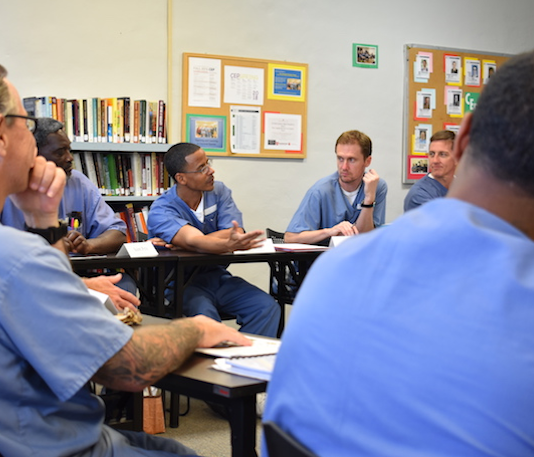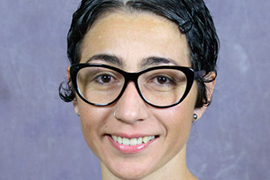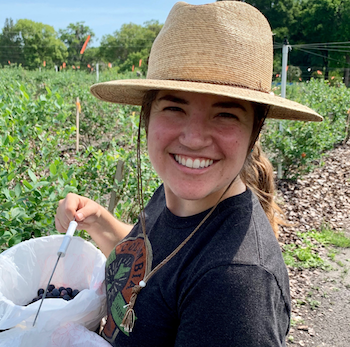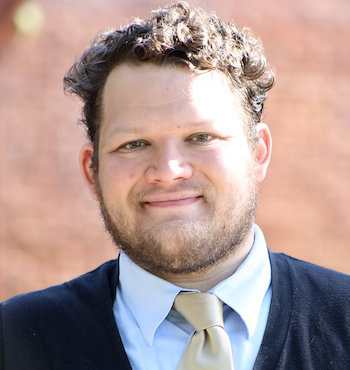Seeding Justice: Stetson receives $359,000 Mellon Foundation grant for college-in-prison program

Stetson University’s Community Education Project (CEP), a multidisciplinary college-in-prison program, is expanding its humanities course offerings at the Tomoka Correctional Institution (TCI) in Daytona Beach, thanks to a $359,000, two-year grant from The Andrew W. Mellon Foundation.
The grant, Seeding Justice: Collaborative Learning Landscapes in Carceral Spaces, was made possible by the foundation’s The Future of Higher Learning in Prison initiative. CEP is the first recipient at Stetson to receive a grant from The Andrew W. Mellon Foundation.
In 2015, a Journal of Critical Scholarship on Higher Education and Student Affairs research article titled “Higher Education in an Era of Mass Incarceration: Possibility Under Constraint” by Erin L. Castro, PhD, et al, showed that among the more than 2.2 million individuals behind bars in the United States, only 6% have access to formal postsecondary educational opportunities.
Since its inception in 2015, CEP has been committed to offering high-quality liberal-arts education to incarcerated students, and for the past three years has been teaching incarcerated students credit-bearing courses and providing them with additional learning, research and teaching opportunities.

“The Andrew W. Mellon Foundation grant will benefit incarcerated students by providing them with an opportunity to be more fully engaged in food studies, learn about planting and harvesting produce in an outdoor classroom,” said Pamela Cappas-Toro, PhD, who is one of CEP’s co-directors and associate professor of world languages and cultures at Stetson.
Besides Cappas-Toro, CEP is led by co-directors Andy Eisen, PhD, visiting assistant professor of history; Melinda Hall, PhD, associate professor of philosophy; and Jelena Petrovic, PhD, associate professor of communication and media studies.
The grant will allow CEP to offer five new courses, including two food studies classes on sustainable food production that explore race, class and gender in the food system, two humanities courses that are aimed toward food studies, and a special topics class on race, food and nation in the Americas.
The grant also will provide CEP with an opportunity to create the garden, an outdoor classroom, and employ a garden manager and postdoctoral fellow in the humanities.
Both positions will have an integral part in the outdoor classroom component, which will include collaboration with CEP faculty and students and a community garden learning landscape with heirloom or historically significant crops such as Seminole pumpkins, Everglades tomatoes, sweet potatoes, cowpeas, Alabama red okra, African runner peanut and Florida broadleaf mustard greens.

“A food studies education is wonderful because it allows the Community Education Project students at the Tomoka Correctional Institution to develop the skills and access the resources to analyze and critique something as fundamental in our lives as food,” explained Sarah Cramer, PhD, visiting assistant professor in sustainable food systems at Stetson, who is teaching two of the grant-funded food studies courses.
The grant monies also will be used for a second edition of CEP’s literary journal More Than Our Blues, which is edited by Denise Yezbick, PhD, who taught two courses at TCI before CEP’s program became accredited, and data analysis and assessment conducted by Steven Smallpage, PhD, assistant professor of political science at Stetson.

“My job is running the data analysis and assessment to translate all of the excellent, hard work that the Community Education Project’s faculty, staff and students have contributed to the program into a language that helps everyone better visualize its return on investment,” said Smallpage. “By doing that, we will understand which interventions and initiatives work and which ones need to be tweaked along with the process for making those adjustments.”
CEP will be collecting a steady stream of student survey responses and reports from its faculty and staff on activities, perceptions and overall satisfaction. CEP students also will be continuously updated on the program’s progress.
-Sandra Carr



